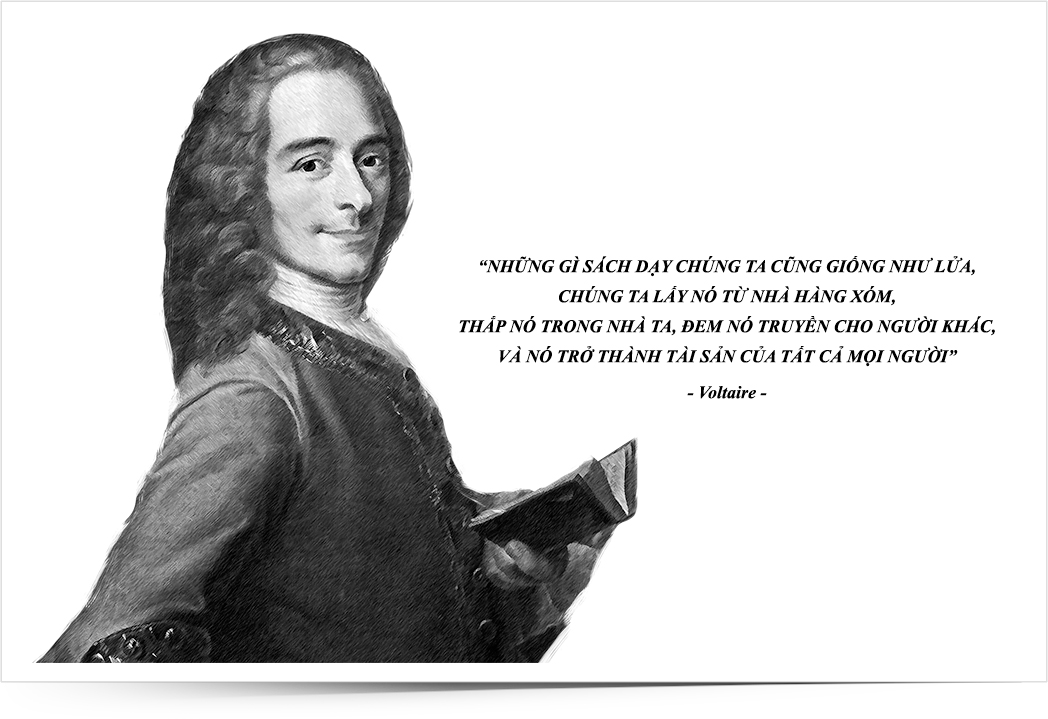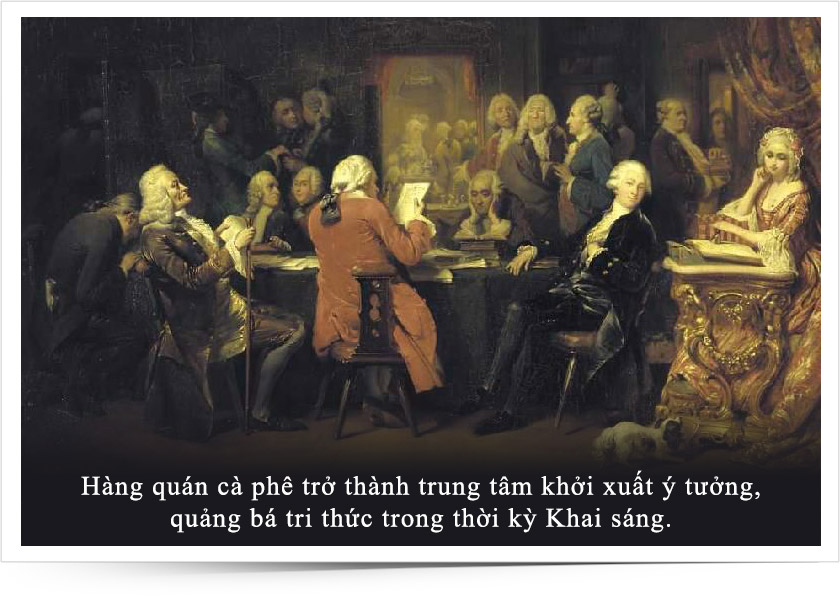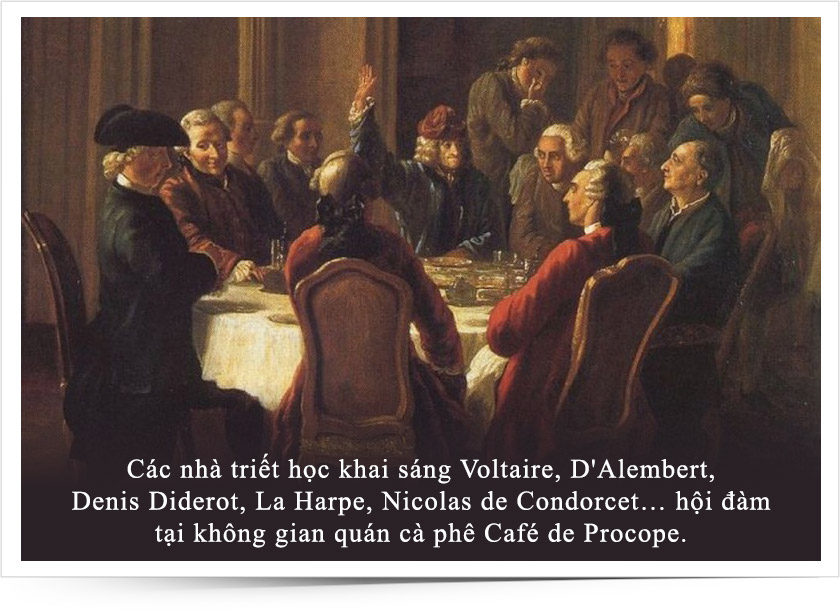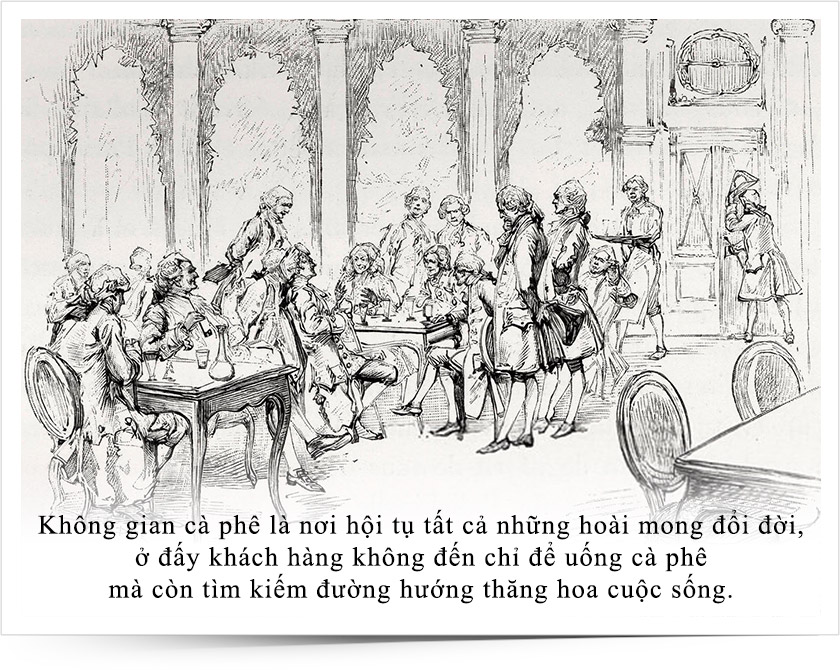Article 16: The Philosopher Voltaire and the Coffee Enlightenment
In the 18th century, Le Siècle des Lumières (the Enlightenment movement) changed the cultural, economic, and social landscape of Europe. The coffee shop became a space to launch ideas that brought people forward to a new lifestyle.

“The instruction we find in books is like fire. We fetch it from our neighbours, kindle it at home, communicate it to others, and it becomes the property of all.” ― Voltaire
Since the 17th century, Europe had witnessed a profound transformation of human relations in society. The feudal social order everywhere was on the wobbly path of collapse. Meaningless wars, the increase of violence made people’s trust in people decrease, consciousness stagnated, intelligence shrank and lost the ability to absorb new things.
In crisis of belief with themselves, the contemporary elite scholar class, despite having many interests related to the feudal system, had also set itself an urgent task: to create a new world. People no longer had the illusion of resurrecting the past society with their belief in gods. They looked forward to a good future built from strength of reason, strength of intellect and creativity. The important feature of this period was the spirit of breaking away from the old thinking, daring to express one’s thoughts in front of the public. According to the father of Empiricism, philosopher Francis Bacon: “Knowledge is power!” became the motto, the lighthouse guiding the way towards the Enlightenment age.
It was during this period that coffee and coffee shops from the East imported to Europe played the role of catalyzing new ideas, spreading knowledge, and promoting the strong development of the Enlightenment movement, especially in countries with a typical coffee enjoying culture such as France, Italy, England, Germany, etc.
A coffee shop is a unique space where everyone, regardless of class, can meet to share personal views, discuss new creations, meet the needs of acquiring and spreading knowledge. Therefore, coffee shops became the center of idea generation and thought transformation during the Enlightenment period.

Coffee shops became centers of idea generation and knowledge promotion during the Enlightenment period.
The European Enlightenment movement developed most brilliantly in the 18th century, especially flourished in France, concentrated on the coffee boulevards Saint-Germain des Prés, Boulevard du Montparnasse, Boulevard Montmartre… One of the typical representatives of the French enlightened intellectual of this period was Voltaire, the pen name of François-Marie Arouet (1694 – 1778).
Voltaire was born and raised in a low-class family of the French nobility. Living under harsh control of the feudal government Louis XIV, Louis XV. Voltaire’s family tried to force him to inherit the family business instead of pursuing his own ambitions. However, Voltaire was a person with a sharp mind with the dark side of contemporary society and a very strong will to fight. He used his talent to write satirical poems that attacked hypocrisy, fanaticism, bad practices, and at the same time expressed his desire for a free and just society.
Encountering the jealousy of the powerful, in 1726 Voltaire went to England to live in exile. Here, Voltaire found the coffee spaces that the British contemporaries honored as “Penny University”. He met and became friends with British intellectuals such as Alexander Pope, Jonathan Swift, John Gay, Edward Young… During the debates, he approached the ideas of the enlightened founders Francis Bacon, Isaac Newton, John Locke, William Shakespeare…
The British coffee society greatly influenced Voltaire’s ideals. He clearly identified the solutions and believed that a progressive society could be built. In 1729, Voltaire returned to France. He and his team collected more than 21,000 books – a huge number at the time – together, they studied history, civilizations, natural sciences, discovered metaphysics related to being and what lies beyond matter… Voltaire’s pen was especially powerful during this period, his works of Le Mondain (The Worldling), Discours sur l’homme (Essay on Man), Essai sur les moeurs et l’esprit des mations (Essay on the customs and spirit of nations), Candide… resonates strongly in the community.
During that time, he discovered that coffee has a positive effect on the mind, making people smarter. Impressed with the role of coffee in the social creative process of the Eastern peoples, Voltaire became a coffee lover. He drank more than 40 cups of coffee a day and often went to Café de Procope to share and perfect the theoretical basis of the spirit of enlightenment with philosophers Rousseau, Diderot, D’Alembert…

Enlightenment philosophers Voltaire, D’Alembert, Denis Diderot, La Harpe, Nicolas de Condorcet… converse at Café de Procope.
Over a cup of coffee, Voltaire read, researched and wrote diligently on all genres of literature, drama, poetry, novels, essays, historical and scientific discussions, etc. He is a pioneering French scholar studying the progress of world civilization in the global context, considering artistic and scientific achievements from practical research, eliminating theological elements. Voltaire wrote more than 2,000 books, large and small, and 20,000 handwritten letters as a way to spread knowledge. Voltaire believed that using the power of knowledge to educate the masses would achieve social progress. He once asserted, “Plus les hommes seront éclairés, et plus ils seront libres – The more men are enlightened, the more they will be free.”
His work greatly influenced the transformation of social consciousness. It is clearly recognized that man is the subject of creating his own history and future. In other words, people can free themselves to create new futures.

The coffee space is the convergence of all life-changing aspirations, where customers come not only to drink coffee but also to find a way to sublimate life.
With the growth of French coffee society in the 18th century, Voltaire’s work became more widely available in coffee shops. His ideas affected all social classes, laying the foundation for the intellectual movement, the French Enlightenment movement. From this movement, the creative spirit is truly honored and fulfills its right role in moving society forward to a new civilization with brilliant development in science, technology, culture, and economy… gives people the inherent freedoms and equality that they should have. And so, the coffee space whether we like it or not has been associated with the process of awakening humanity in the direction that people want to sublimate their destiny from their own wise thinking.
*Coming up: Honoré de Balzac “When I drink coffee, ideas appear”


